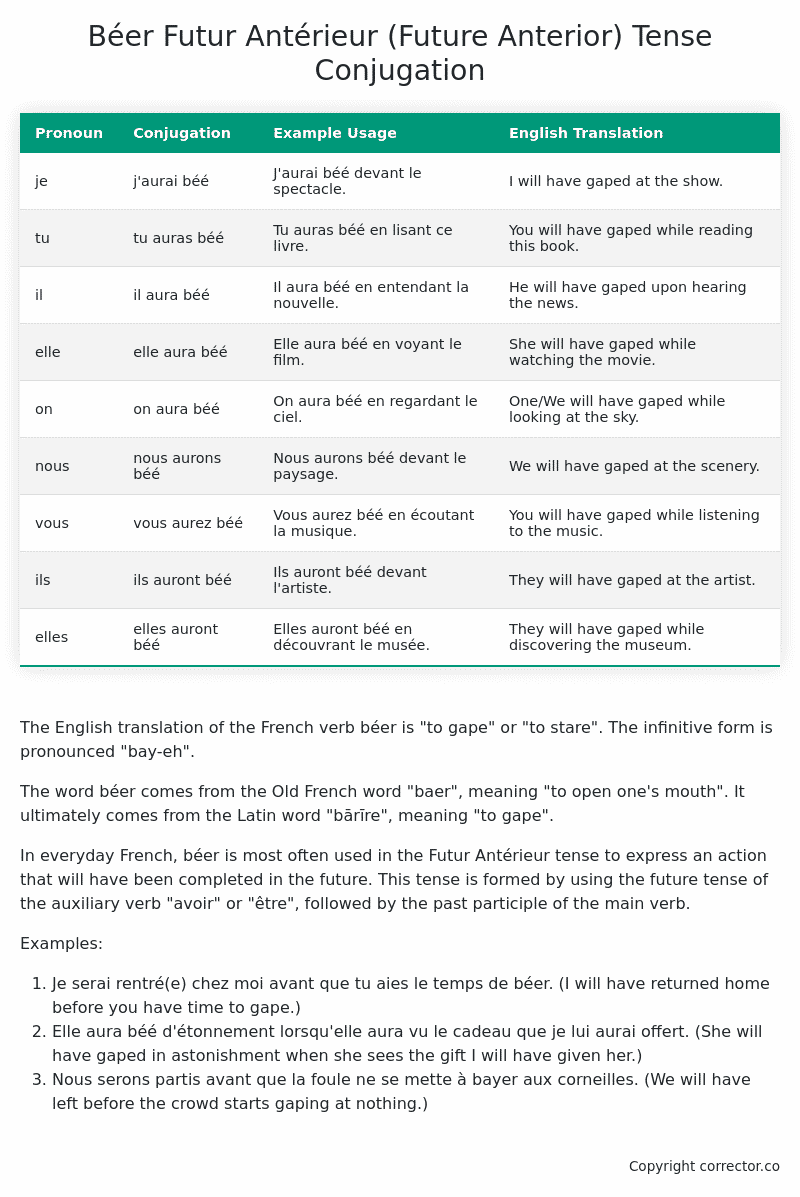Futur Antérieur (Future Anterior) Tense Conjugation of the French Verb béer
Introduction to the verb béer
The English translation of the French verb béer is “to gape” or “to stare”. The infinitive form is pronounced “bay-eh”.
The word béer comes from the Old French word “baer”, meaning “to open one’s mouth”. It ultimately comes from the Latin word “bārīre”, meaning “to gape”.
In everyday French, béer is most often used in the Futur Antérieur tense to express an action that will have been completed in the future. This tense is formed by using the future tense of the auxiliary verb “avoir” or “être”, followed by the past participle of the main verb.
Examples:
- Je serai rentré(e) chez moi avant que tu aies le temps de béer. (I will have returned home before you have time to gape.)
- Elle aura béé d’étonnement lorsqu’elle aura vu le cadeau que je lui aurai offert. (She will have gaped in astonishment when she sees the gift I will have given her.)
- Nous serons partis avant que la foule ne se mette à bayer aux corneilles. (We will have left before the crowd starts gaping at nothing.)
Table of the Futur Antérieur (Future Anterior) Tense Conjugation of béer
| Pronoun | Conjugation | Example Usage | English Translation |
|---|---|---|---|
| je | j’aurai béé | J’aurai béé devant le spectacle. | I will have gaped at the show. |
| tu | tu auras béé | Tu auras béé en lisant ce livre. | You will have gaped while reading this book. |
| il | il aura béé | Il aura béé en entendant la nouvelle. | He will have gaped upon hearing the news. |
| elle | elle aura béé | Elle aura béé en voyant le film. | She will have gaped while watching the movie. |
| on | on aura béé | On aura béé en regardant le ciel. | One/We will have gaped while looking at the sky. |
| nous | nous aurons béé | Nous aurons béé devant le paysage. | We will have gaped at the scenery. |
| vous | vous aurez béé | Vous aurez béé en écoutant la musique. | You will have gaped while listening to the music. |
| ils | ils auront béé | Ils auront béé devant l’artiste. | They will have gaped at the artist. |
| elles | elles auront béé | Elles auront béé en découvrant le musée. | They will have gaped while discovering the museum. |
Other Conjugations for Béer.
Le Present (Present Tense) Conjugation of the French Verb béer
Imparfait (Imperfect) Tense Conjugation of the French Verb béer
Passé Simple (Simple Past) Tense Conjugation of the French Verb béer
Passé Composé (Present Perfect) Tense Conjugation of the French Verb béer
Futur Simple (Simple Future) Tense Conjugation of the French Verb béer
Futur Proche (Near Future) Tense Conjugation of the French Verb béer
Plus-que-parfait (Pluperfect) Tense Conjugation of the French Verb béer
Passé Antérieur (Past Anterior) Tense Conjugation of the French Verb béer
Futur Antérieur (Future Anterior) Tense Conjugation of the French Verb béer (this article)
Subjonctif Présent (Subjunctive Present) Tense Conjugation of the French Verb béer
Subjonctif Passé (Subjunctive Past) Tense Conjugation of the French Verb béer
Subjonctif Imparfait (Subjunctive Imperfect) Tense Conjugation of the French Verb béer
Subjonctif Plus-que-parfait (Subjunctive Pluperfect) Tense Conjugation of the French Verb béer
Conditionnel Présent (Conditional Present) Tense Conjugation of the French Verb béer
Conditionnel Passé (Conditional Past) Tense Conjugation of the French Verb béer
L’impératif Présent (Imperative Present) Tense Conjugation of the French Verb béer
L’infinitif Présent (Infinitive Present) Tense Conjugation of the French Verb béer
Struggling with French verbs or the language in general? Why not use our free French Grammar Checker – no registration required!
Get a FREE Download Study Sheet of this Conjugation 🔥
Simply right click the image below, click “save image” and get your free reference for the béer Futur Antérieur tense conjugation!

Béer – About the French Futur Antérieur (Future Anterior) Tense
Construction
Common Everyday Usage Patterns
Interactions with Other Tenses
For example
Summary
I hope you enjoyed this article on the verb béer. Still in a learning mood? Check out another TOTALLY random French verb conjugation!


